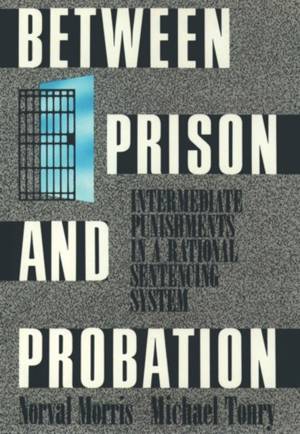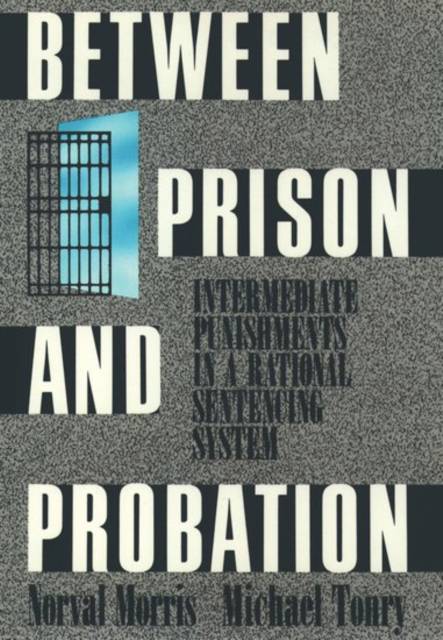
Bedankt voor het vertrouwen het afgelopen jaar! Om jou te bedanken bieden we GRATIS verzending (in België) aan op alles gedurende de hele maand januari.
- Afhalen na 1 uur in een winkel met voorraad
- In januari gratis thuislevering in België
- Ruim aanbod met 7 miljoen producten
Bedankt voor het vertrouwen het afgelopen jaar! Om jou te bedanken bieden we GRATIS verzending (in België) aan op alles gedurende de hele maand januari.
- Afhalen na 1 uur in een winkel met voorraad
- In januari gratis thuislevering in België
- Ruim aanbod met 7 miljoen producten
Zoeken
Between Prison and Probation
Intermediate Punishments in a Rational Sentencing System
Norval Morris, Michael H Tonry
Paperback | Engels
€ 67,95
+ 135 punten
Omschrijving
Across the country prisons are jammed to capacity and, in extreme cases, barges and mobile homes are used to stem the overflow. Probation officers in some cities have caseloads of 200 and more--hardly a manageable number of offenders to track and supervise. And with about one million people in prison and jail, and two and a half million on probation, it is clear we are experiencing a crisis in our penal system.
In Between Prison and Probation, Norval Morris and Michael Tonry, two of the nation's leading criminologists, offer an important and timely strategy for alleviating these problems. They argue that our overwhelmed corrections system cannot cope with the flow of convicted offenders because the two extremes of punishment--imprisonment and probation--are both used excessively, with a near-vacuum of useful punishments in between. Morris and Tonry propose instead a comprehensive program that relies on a range of punishment including fines and other financial sanctions, community service, house arrest, intensive probation, closely supervised treatment programs for drugs, alcohol and mental illness, and electronic monitoring of movement. Used in rational combinations, these "intermediate" punishments would better serve the community than our present polarized choice. Serious consideration of these punishments has been hindered by the widespread perception that they are therapeutic rather than punitive. The reality, however, Morris and Tonry argue, "is that the American criminal justice system is both too severe and too lenient--almost randomly." Systematically implemented and rigorously enforced, intermediate punishments can "better and more economically serve the community, the victim, and the criminal than the prison terms and probation orders they supplant."
Between Prison and Probation goes beyond mere advocacy of an increasing use of intermediate punishments; the book also addresses the difficult task of fitting these punishments into a comprehensive, fair and community-protective sentencing system.
In Between Prison and Probation, Norval Morris and Michael Tonry, two of the nation's leading criminologists, offer an important and timely strategy for alleviating these problems. They argue that our overwhelmed corrections system cannot cope with the flow of convicted offenders because the two extremes of punishment--imprisonment and probation--are both used excessively, with a near-vacuum of useful punishments in between. Morris and Tonry propose instead a comprehensive program that relies on a range of punishment including fines and other financial sanctions, community service, house arrest, intensive probation, closely supervised treatment programs for drugs, alcohol and mental illness, and electronic monitoring of movement. Used in rational combinations, these "intermediate" punishments would better serve the community than our present polarized choice. Serious consideration of these punishments has been hindered by the widespread perception that they are therapeutic rather than punitive. The reality, however, Morris and Tonry argue, "is that the American criminal justice system is both too severe and too lenient--almost randomly." Systematically implemented and rigorously enforced, intermediate punishments can "better and more economically serve the community, the victim, and the criminal than the prison terms and probation orders they supplant."
Between Prison and Probation goes beyond mere advocacy of an increasing use of intermediate punishments; the book also addresses the difficult task of fitting these punishments into a comprehensive, fair and community-protective sentencing system.
Specificaties
Betrokkenen
- Auteur(s):
- Uitgeverij:
Inhoud
- Aantal bladzijden:
- 304
- Taal:
- Engels
Eigenschappen
- Productcode (EAN):
- 9780195071382
- Verschijningsdatum:
- 12/09/1991
- Uitvoering:
- Paperback
- Formaat:
- Trade paperback (VS)
- Afmetingen:
- 140 mm x 217 mm
- Gewicht:
- 403 g

Alleen bij Standaard Boekhandel
+ 135 punten op je klantenkaart van Standaard Boekhandel
Beoordelingen
We publiceren alleen reviews die voldoen aan de voorwaarden voor reviews. Bekijk onze voorwaarden voor reviews.









